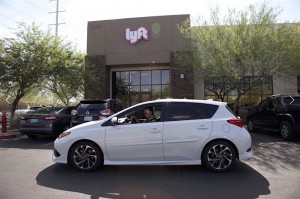
Lyft founders Logan Green, left, and John Zimmer, right, with GM President Dan Ammann after inking a $500M partnership, which jumped another $500M.
General Motors could turn a large investment into an even bigger profit if the IPO of the nation’s second-largest ride-sharing service goes off as planned today.
On Thursday, Lyft announced it was targeting $72 a share for its public debut. At that price, GM’s 18.6 million Class A shares would be worth more than $1.3 billion, a big increase over the $500 million it originally invested in Lyft back in January 2016.
The question is whether the Detroit automaker will take the money and run or continue to work with Lyft. When it announced its investment more than three years ago, GM indicated it saw an opportunity to not just provide products to Lyft drivers but also to use the service as a test bed for the autonomous vehicles it was developing. But it now appears to be shifting focus to Maven, a service that could soon become a major Lyft competitor.
As “a significant investor,” GM CEO Mary Barra told CNBC last week, the automaker will be watching Lyft’s IPO “with great interest.”
(Lyft IPO depends on an autonomous future. Click Here for the story.)

Lyft continues to grow, but to accelerate that, the company is looking to raise big money through an IPO.
General Motors actually tried to buy Lyft early on. When it was rebuffed by the service’s management it subsequently came back with what was, at the time, one of the largest investments made in the ride-hailing company. Lyft has since drawn in a number of major backers, raising $2 billion this week ahead of the IPO.
The automaker early on identified several reasons for the alliance. For one thing, it saw an opportunity to create a market for its vehicles through the Express Drive program which allows Lyft drivers to rent a vehicle, rather than run up miles on their own cars.
That could prove a more and more significant move if, as many transportation analysts have forecast, ride-hailing services become a viable alternative for millions of Americans who would no longer want to own a personal vehicle.
A study released a year ago by the Boston Consulting Group, or BCG, forecast that by 2030 as much as 30% of the miles Americans travel by road will be in vehicles operated by companies like Lyft.
How much of an alternative ride-hailing actually becomes, however, is expected to depend upon several major developments in automotive technology, the shift to electrified vehicles and the emergence of fully autonomous vehicles.
Right now, Lyft – like rival Uber – continues to operate deeply in the red, in large part because the drivers who contract with the service make up its single-biggest cost. The BCG study estimated that the cost of providing rides would drop by roughly half, on a per-mile basis, once companies like Lyft could field fleets of completely driverless vehicles. That would be the key to making ride-sharing a viable alternative to personal vehicle ownership, BCG researchers stressed.
But there have been signs of growing friction between Lyft and GM. Where the ride-sharing service once was expected to play a major role in putting on the road the autonomous Chevrolet Bolt EVs GM is preparing to build, the automaker now seems to be focused on using its own, in-house service, Maven.
(Click Here for more about Waymo’s new driverless taxi service.)
“Right now … we have no active projects underway” with Lyft, GM CEO Barra said last June.
Just months later, Dan Ammann, the General Motors president who initiated the Lyft alliance, announced he would move over to Cruise Automation, GM’s autonomous driving research subsidiary, as its new CEO.

Uber CEO Dara Khosrowshahi has been making substantive changes to the company since his arrival. The company may follow Lyft's lead with an IPO later this year.
Cruise technology will be used when GM rolls out the first autonomous versions of its Chevrolet Bolt EV battery-car, something that is expected to happen this year. However, it now appears those vehicles will, at least initially, be put into a fleet operated by Maven, GM’s own vehicle sharing service.
For its part, Lyft has launched its own autonomous vehicle development program. And it is working with several other automakers, as well as GM.
GM said it is not ready to comment on the Lyft IPO or any plans it might have once that happens. The company could retain its full stake or sell off some or all of its share.
GM won’t have to decide immediately, as a major investor it won’t be able to cash out for at least six months and the stock price of what will be traded as LYFT could vary sharply by then.
(BMW, Daimler launch new ride-sharing venture. Click Here for the story.)
Meanwhile, Lyft’s primary rival, Uber, is preparing to stage its own IPO, something that could follow this year.

